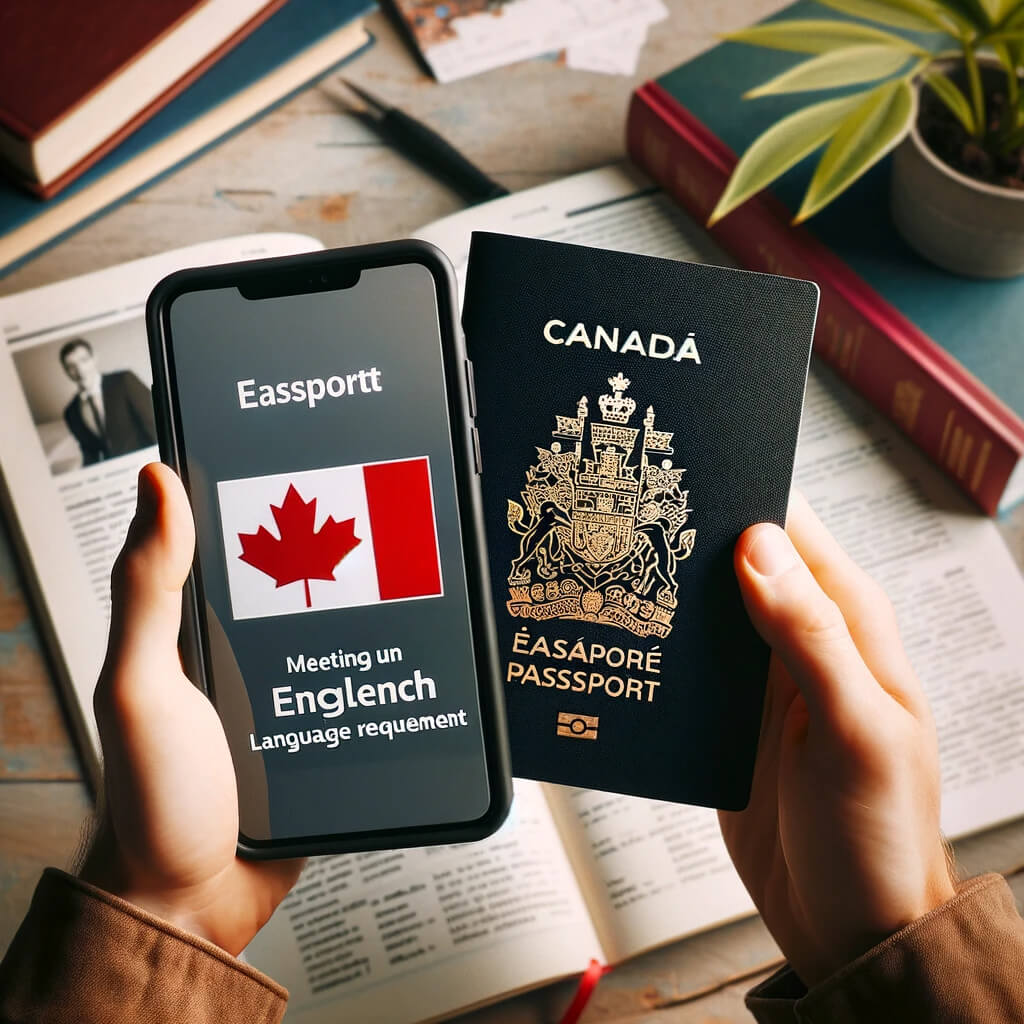Canada Immigration Without IELTS: Your 2024 Guide
Your Quick 30-Second Answer on Canada Immigration Without IELTS
In Canadian immigration, IELTS exemptions are specific and limited. Key scenarios include Family Class Sponsorship for spouses or dependents, where no language proof is needed. Certain Provincial Nominee Programs (PNPs) might waive language tests for specific low-skilled jobs. Applicants under 18 or over 54 years old, those applying on humanitarian and compassionate grounds, refugees, and asylum seekers are also exempt from language requirements. In Quebec, under the Quebec-Selected Skilled Workers program, exemptions exist, especially with a validated job offer. Lastly, some business immigration streams for investors or entrepreneurs may not require language testing. Then there are alternatives like CELPIP and TCF Canada for language proficiency, alongside Provincial Nominee Programs (PNPs) such as Saskatchewan's SINP and Manitoba's MPNP which offer lower language requirements. Overall, Canada's inclusive immigration system opens doors for aspiring immigrants, irrespective of their IELTS scores, enriching the country's diverse and multicultural landscape.
For an in-depth overview, please see the "Table of Contents" below.
Navigate PR and Work through Canada Immigration Without IELTS!
Welcome to our comprehensive guide, where we unravel the nuances of Canada immigration without IELTS, offering key insights and practical advice for your journey. This is your guide to Canadian permanent residence. Primarily, this guide is for anyone who wants to learn about immigration to Canada. If you find the official rules and documents about the requirements to move to Canada confusing, this guide can be your helpful friend. Whether driven by economic opportunities, Canada offers a range of avenues including provincial nomination programs. Plus, it's packed with insider secrets to help you shine brighter than the rest when you apply!
TABLE OF CONTENT
Pathways without IELTs
1. To the Point Direct Answer
2. Country-wise without IELTS
3. Immigration without IELTS
4. Process without IELTS
Language Exemptions No-IELTs
5. Exemptions and Alternatives
Visa Types Without IELTs
6. Visas without IELTS
Working without IELTs
7. Work Opportunities
8. Key Points Summary
Resource and Information
9. FAQs - Immigration Without IELTS
10. Additional Resources

1. Your Direct to the Point Answer to Canada Immigration Without IELTS
Canada Immigration Without IELTS: A Concise Guide
Canada immigration without IELTS primarily revolves around finding ways to immigrate to Canada without the need for the IELTS exam. Immigration scenarios where the IELTS (or similar English language tests) is completely waived are quite specific and limited. You may also be able to study without IELTs or work without IELTS in Canada. Here are some situations where language proficiency tests may be exempt:
1. Family Class Sponsorship: Under the Family Class Sponsorship program, if you are being sponsored by a family member (spouse, partner, parent, etc.) who is a Canadian citizen or permanent resident, you are not required to provide proof of language proficiency. This applies to:
- Spousal Sponsorship
- Dependent Child Sponsorship
- Parent and Grandparent Sponsorship
2. Certain Provincial Nominee Programs (PNPs) for Low-Skilled Occupations: Some PNPs have streams that do not require language testing for specific low-skilled or semi-skilled occupations. However, these streams are quite specific to the labor needs of the province and may have other stringent requirements.
3. Immigration for Individuals Under 18 or Over 54: In some immigration categories, applicants who are under 18 or over 54 years of age at the time of application are exempt from proving language proficiency.
4. Humanitarian and Compassionate Grounds: Applicants who apply for permanent residence on humanitarian and compassionate grounds may not need to meet language requirements. This is particularly the case if they are already in Canada and have established strong ties to the community.
5. Refugees and Asylum Seekers: Individuals granted refugee status in Canada or asylum seekers do not need to meet language requirements for permanent residence.
6. Quebec-Selected Skilled Workers: Quebec has its immigration selection system and criteria. While proficiency in French is often advantageous, there are scenarios, particularly for applicants with a validated job offer or who are already working in Quebec, where English language proficiency tests may not be mandatory.
7. Certain Business Immigration Programs: Some business immigration streams, especially those for high-net-worth investors or entrepreneurs where job creation and investment are the primary criteria, may have exemptions from language proficiency tests.
Remember, immigration policies can change, and each program or stream has its specific requirements and conditions. Always check the latest information from Immigration, Refugees and Citizenship Canada (IRCC) or the immigration website of the specific province for the most current and accurate details.
1. Alternative Language Proficiency Tests:
- Canada accepts other English language tests like CELPIP (Canadian English Language Proficiency Index Program).
- For French speakers, tests like TCF Canada are viable options.
2. Provincial Nominee Programs (PNPs):
- Certain PNPs, such as those in Saskatchewan and Manitoba, have lower or different language requirements.
- These programs often focus more on the applicant's skills and job prospects.
3. Specific Immigration Streams:
- Atlantic Immigration Pilot: For skilled workers willing to live in Atlantic provinces with a job offer.
- Rural and Northern Immigration Pilot: Targets immigrants for specific rural communities.
4. French Language Advantage:
- Proficiency in French can be beneficial, particularly for programs aiming to support French-speaking communities outside Quebec.
5. Family Sponsorship:
- Having a family member in Canada can sometimes lead to immigration opportunities without language test requirements.
6. Work or Study in Canada:
- Certain work permits or study visas may offer pathways to permanent residency without IELTS.
7. Express Entry System:
- While language proficiency is a factor, having strong credentials in other areas like work experience can compensate.
Understanding the Requirements: It’s crucial to understand the specific requirements of each program or stream. Each has its own criteria, and some might have language proficiency waivers or alternatives. For those looking to navigate Canada immigration without IELTS, it's important to explore all available options and align them with personal circumstances and qualifications. Canada offers diverse pathways, making it possible for many to achieve their immigration goals without the IELTS hurdle.
2. Country-Specific Pathways for Immigration without IELTS

Region-Specific Opportunities and Pathways
Exploring immigration to Canada often brings up the International English Language Testing System (IELTS) as a key requirement. However, "Canada immigration without IELTS" is a viable option, especially when looking at region-specific opportunities in America, the Caribbean, and the Schengen area. This article delves into the visa requirements, opportunities, and alternatives for those aspiring to move to Canada without the IELTS barrier.
Visa Requirements and Opportunities in America (North, Central, South)
For individuals in the Americas, the Canadian immigration landscape offers several pathways that don't strictly hinge on IELTS scores. The Express Entry program, for instance, evaluates candidates based on a Comprehensive Ranking System (CRS), where language proficiency is just one aspect. Alternatives like the CELPIP are accepted, and in some cases, language proficiency might not be a stringent requirement, particularly in specific Provincial Nominee Programs (PNPs) like the Saskatchewan Immigrant Nominee Program (SINP) or the Manitoba Provincial Nominee Program (MPNP).
Traveling to Island Nations: Focus on the Caribbean and Others
For Caribbean nations like Antigua, St. Kitts, and St. Lucia, Canada offers intriguing immigration opportunities. As of June 2023, citizens of these countries enjoy visa-free access to Canada through the electronic travel authorization (eTA) program, simplifying their travel and potential immigration process. This ease of access opens doors for individuals from these regions to explore Canadian immigration pathways, such as the Atlantic Immigration Program (AIP), which has relatively low language requirements and is tailored for skilled workers and international graduates.
Exploring the Schengen Area with a Canadian Student Visa
For those in the Schengen area eyeing Canadian immigration, the student visa route presents a strategic pathway. Canada's education system is highly regarded, and international students can leverage their Canadian credentials to transition into permanent residency. Programs like the Canadian Experience Class (CEC) under the Express Entry system offer a seamless shift from student status to permanent residents, with language proficiency assessed through various tests, not just IELTS. This flexibility allows students from the Schengen area to plan their Canadian immigration journey, starting as international students and gradually transitioning to permanent residents.
"Canada immigration without IELTS" is not just a query; it's a window to a myriad of opportunities for potential immigrants from America, the Caribbean, and the Schengen area. Whether it's through PNPs with lower language requirements or alternative programs tailored for specific regions, the Canadian immigration system offers diverse pathways. These alternatives ensure that the dream of living in Canada is accessible to a broader range of people, transcending the traditional barriers posed by language proficiency tests like IELTS.
3. Other Alternative Pathways for Immigration Without IELTS

Understanding Immigration Pathways Without IELTS Requirement
Canada immigration without IELTS" offers various pathways for those looking to immigrate to Canada without the conventional IELTS exam. One such pathway is the Provincial Nominee Programs (PNPs), including the Saskatchewan Immigrant Nominee Program (SINP) and Manitoba Provincial Nominee Program (MPNP), which have lower IELTS score requirements. These programs allow provinces to nominate individuals for immigration based on their skills and potential to contribute to the local economy.
Different Pathways to Immigrate to Canada Without the IELTS Exam
To navigate "Canada immigration without IELTS," it’s crucial to understand the alternatives to IELTS. Programs like the Canadian Experience Class (CEC) within the Express Entry system, and the Atlantic Immigration Program (AIP) offer routes for skilled workers and international graduates with lower language proficiency levels. These programs assess candidates based on comprehensive criteria, including work experience, education, and language skills, where tests other than IELTS, such as the CELPIP, are accepted.
Alternative English Proficiency Tests and Immigration Categories Without Language Tests
Apart from IELTS, other English proficiency tests like CELPIP (Canadian English Language Proficiency Index Program) are recognized by Canadian immigration programs. The LMIA-based visa, a work permit program, does not always require a language test for eligibility. This pathway is suitable for those with a job offer from a Canadian employer and does not hinge on the applicant's language proficiency. Furthermore, the French-speaking Skilled Worker Stream offers an alternative for those proficient in French, bypassing the IELTS requirement.
"Canada immigration without IELTS" is a practical and achievable goal for many aspiring immigrants. By exploring the various programs and alternatives to the IELTS, individuals can find a suitable pathway that aligns with their skills, experience, and language proficiency. Whether it's through PNPs, employer-driven programs, or language-specific streams, the Canadian immigration system provides diverse options to embark on a new life in Canada.
4. Canada's Immigration Process without IELTS

Focusing on Non-IELTS Routes
When exploring "Canada immigration without IELTS," it's essential to comprehend the various processes involved in Canadian immigration. While the IELTS exam is a common requirement, there are multiple alternatives and exemptions. For instance, the CELPIP (Canadian English Language Proficiency Index Program) is an alternative English proficiency test accepted by Canadian immigration authorities. Additionally, the Temporary Foreign Worker (TFW) Program and the French-speaking Skilled Worker Stream provide routes for those unable to meet the IELTS requirements. These programs offer diverse opportunities for skilled foreign workers, family members, and French-speaking individuals to immigrate to Canada.
Detailed Breakdown of the Immigration Process, Focusing on Non-IELTS Routes
The Canadian immigration process without IELTS includes several steps, starting from assessing eligibility to submitting applications through specific programs. The Provincial Nominee Programs (PNPs) like the Saskatchewan Immigrant Nominee Program (SINP) and the Manitoba Provincial Nominee Program (MPNP) offer pathways with more lenient language requirements. Similarly, the Atlantic Immigration Program (AIP) caters to candidates with low IELTS scores, focusing on skilled workers and international graduates.
Eligibility Criteria Without IELTS
The eligibility criteria for "Canada immigration without IELTS" vary depending on the chosen program. Programs like the SINP and MPNP require candidates to have specific skill sets and work experience in in-demand occupations. The AIP requires a job offer from a designated employer in the Atlantic provinces and a low IELTS score or its equivalent. In contrast, the LMIA-based visa does not typically require a language proficiency test, as employers are responsible for assessing the language skills of foreign workers relevant to the job.
Understanding the procedures and requirements for "Canada immigration without IELTS" is crucial for potential immigrants. With a variety of programs offering different pathways, such as PNPs, employer-driven programs, and language-specific streams, Canada presents multiple opportunities for skilled foreign workers, international students, and family members to immigrate without the need for IELTS. This inclusive approach allows a broader spectrum of individuals to start a new life in Canada, contributing to its diverse culture and thriving economy.
5. Exploring Language Exemptions and Alternatives

Language Exemptions in Canadian Immigration
When considering "Canada immigration without IELTS," it's important to recognize that certain scenarios allow for language exemptions. For instance, if you have a relative who is a Canadian citizen or permanent resident, they can sponsor you to become a permanent resident in Canada without needing a language test. Additionally, some jobs may not require fluency in English or French, depending on the nature of the work and the employer's requirements. This opens up opportunities for foreign nationals to immigrate to Canada even without meeting the typical language proficiency standards.
Conditions Under Which IELTS Can Be Waived
In Canadian immigration, there are specific conditions under which the IELTS can be waived. For instance, enrolling in language courses and subsequently enrolling in a full-time study program can allow you to receive a Canadian study permit without taking the language test. Furthermore, several provinces under Canada’s Provincial Nominee Programs (PNPs) have low or no language proficiency requirements, especially if you have work experience in in-demand occupations in that particular province.
Alternative Language Tests and Exemptions
Canadian immigration also recognizes alternative language tests to IELTS. The Canadian English Language Proficiency Index Program (CELPIP) and the Test de connaissance du français pour le Canada (TCF Canada) are accepted language proficiency tests. CELPIP is specifically designed for Canadian immigration and assesses proficiency in listening, reading, writing, and speaking based on real-life situations. Similarly, TCF Canada is recognized by the Canadian government for immigration and citizenship purposes, evaluating French language proficiency in reading, writing, listening, and speaking. These tests offer alternative pathways for individuals who may not be able to take the IELTS or prefer testing in a different format.
"Canada immigration without IELTS" is a feasible option for many aspiring immigrants, thanks to various language exemptions and alternatives. Whether through family sponsorship, job offers, language courses, or PNPs, the Canadian immigration system provides numerous avenues for those who may not meet the typical language test requirements. This inclusive approach not only diversifies the pool of potential immigrants but also enriches the multicultural fabric of Canadian society.
6. Visa Types for Canada Immigration That Don’t Require IELTS

Overview of Visa Options and Programs
Exploring "Canada immigration without IELTS" uncovers various visa options for potential immigrants. The Atlantic Immigration Program (AIP) is particularly notable, as it allows skilled workers and international graduates to immigrate to Canada's Atlantic provinces (Nova Scotia, New Brunswick, Newfoundland and Labrador, and Prince Edward Island) with relatively low IELTS score requirements. Furthermore, the Quebec Skilled Worker Program (QSWP) and the Quebec Experience Class (PEQ) focus on French language proficiency, providing alternatives to IELTS for those fluent in French and seeking to work or study in Quebec.
Insights into Specific Immigration Programs Bypassing IELTS
Several immigration programs offer pathways to Canada that bypass traditional IELTS requirements. The LMIA-based visa, a type of work permit, allows Canadian employers to hire foreign workers without necessitating an IELTS score. Moreover, Intra-Company Transfers and immigration opportunities under trade agreements like NAFTA, CETA, and CPTPP enable professionals from specific countries to work in Canada without IELTS scores. These programs emphasize the applicant's professional status and job offer in Canada rather than language proficiency.
Permanent Residency Pathways Without IELTS
For those seeking permanent residency in Canada without IELTS, various pathways are available. The Provincial Nominee Programs (PNPs), such as the Saskatchewan Immigrant Nominee Program (SINP) and the Manitoba Provincial Nominee Program (MPNP), have more lenient language requirements. Additionally, family sponsorship remains a viable option, allowing Canadian citizens or permanent residents to sponsor relatives for permanent residency, circumventing the language test requirement.
Routes to Permanent Residency That Don’t Require IELTS
The AIP and specific PNPs offer routes to permanent residency with minimal or no IELTS requirements. These programs are tailored to the economic needs of specific regions and provinces in Canada, focusing on filling in-demand occupations. For example, the SINP targets skilled workers in specific sectors, while the MPNP focuses on applicants with family members in Manitoba willing to sponsor them. These programs provide a unique opportunity for immigrants to contribute to the local economy while settling in Canada.
Case Studies and Success Stories
Numerous success stories emerge from these alternative pathways. For instance, candidates who have utilized the AIP have found success in settling in the Atlantic provinces, benefiting from the lower language requirements and the support of local employers. Similarly, the SINP and MPNP have enabled individuals with basic English skills to establish themselves in Canada, contributing to sectors with high demand for skilled labor. These success stories highlight the viability of Canada immigration without IELTS and the diverse opportunities available across Canadian provinces.
"Canada immigration without IELTS" opens up a world of possibilities for those who may not meet traditional language requirements. With programs like the AIP, PNPs, and unique provincial initiatives, Canada offers a range of options for skilled workers, students, and family members to immigrate and thrive in the country. These programs not only facilitate the immigration process but also contribute to Canada's multicultural landscape and economic growth.
7. Work Opportunities in Canada Without IELTS

Opportunities for Work and Express Entry
Exploring "Canada immigration without IELTS" reveals various avenues for skilled workers seeking job opportunities in Canada without the IELTS requirement. The LMIA-based visa, for instance, offers a pathway for skilled foreign workers to obtain employment in Canada without needing IELTS scores. This program focuses on the needs of Canadian employers unable to find qualified Canadian workers, hence relying on foreign talent. Additionally, specific provinces offer unique opportunities; for example, the Manitoba PNP targets skilled immigrants with family members in the province, emphasizing familial connections over language proficiency.
Job Opportunities for Skilled Workers Without IELTS
Skilled workers have numerous opportunities to work in Canada without IELTS scores. The Atlantic Immigration Program (AIP), for example, allows skilled workers to find employment in Atlantic provinces with relatively low language requirements. Moreover, Quebec’s immigration programs, such as the Quebec Skilled Worker Program (QSWP) and Quebec Experience Class (PEQ), evaluate French language skills, providing an alternative for those proficient in French. These programs cater to skilled immigrants in various sectors, from technology to healthcare, facilitating their integration into the Canadian workforce.
Requirements for Foreign Workers in Non-IELTS Scenarios
For foreign workers seeking to immigrate to Canada without IELTS, specific requirements must be met. These include having a valid job offer from a Canadian employer, meeting the criteria set by the respective province or territory under PNPs, and proving language competency in French if applying through Quebec’s programs. Additionally, certain programs may require a positive Labor Market Impact Assessment (LMIA), ensuring that the employment of foreign workers does not negatively impact the local job market.
Express Entry and Language Proficiency
The Express Entry system is Canada’s primary pathway for skilled immigration. While it generally requires IELTS scores for English language proficiency, there are exceptions. For instance, candidates proficient in French can gain additional points in the Express Entry pool, especially with the recent changes allocating more points to French-speaking applicants. This shift aims to support the development of French-speaking minority communities outside Quebec.
Understanding Express Entry Without IELTS
To comprehend Express Entry without IELTS, it's essential to understand how language proficiency is assessed in this system. Candidates with French language proficiency can benefit significantly, with the Express Entry profile considering French language skills in the assessment. Furthermore, the Comprehensive Ranking System (CRS) score, a key component of Express Entry, awards points for language proficiency, and French speakers can gain an edge in this competitive immigration process.
How Language Proficiency is Assessed Outside IELTS
Outside of IELTS, language proficiency in the Express Entry system can be demonstrated through alternative tests such as the CELPIP for English or the TCF Canada for French. These tests assess language skills relevant to Canadian life and work. Additionally, for certain immigration programs, especially those under PNPs, the language proficiency requirements may be lower, catering to the specific needs and contexts of the respective provinces.
"Canada immigration without IELTS" offers diverse opportunities for skilled workers, enabling them to leverage their expertise in various sectors across Canada. Whether through LMIA-based visas, provincial nomination programs, or the Express Entry system, Canada provides multiple pathways for immigrants to contribute to its economy and society, even without IELTS scores. This inclusive approach not only enriches the Canadian workforce but also strengthens the multicultural fabric of Canadian society.
8. Summary of Key Points on Immigrating to Canada Without IELTS

As we wrap up our comprehensive exploration of "Canada immigration without IELTS," let's revisit the key points that illuminate the myriad of opportunities available for potential immigrants. Canada's inclusive and diverse immigration system offers several pathways that do not strictly require IELTS, making it an inviting destination for individuals worldwide.
Key Points on Immigrating to Canada Without IELTS
- Alternative Language Tests: Besides IELTS, tests like CELPIP and TEF Canada are accepted, broadening the scope for proving language proficiency.
- Provincial Nominee Programs (PNPs): Programs like SINP and MPNP provide opportunities for immigration with lower language requirements, focusing more on job skills and provincial needs.
- Family Sponsorship and LMIA-based Visas: These pathways allow immigration without stringent language test requirements, highlighting Canada's commitment to family unification and labor market needs.
- French Language Proficiency: Proficiency in French can be an asset, especially with programs targeting French-speaking immigrants, like the Federal Skilled Trades Program and various PNPs.
- Educational Opportunities: International students can leverage programs like the Study Permit to transition to permanent resident status, bypassing IELTS in certain scenarios.
- Express Entry System: Though it typically requires language proficiency, exceptions exist, particularly for French speakers, reflecting the federal government's support for bilingualism.
- Economic Immigration Programs: These programs, such as the AIP, cater to skilled workers and adapt their language requirements to the economic needs of specific regions in Canada.
Encouragement and Final Advice for Potential Immigrants
Embarking on the journey of "Canada immigration without IELTS" can be a rewarding experience. It's important to thoroughly research and understand the various programs and their specific requirements. Utilizing the services of immigration consultants or lawyers can provide valuable guidance. Remember, your unique skills, experiences, and potential contributions to Canadian society are highly valued. Whether you're a skilled worker, a family member seeking reunification, or a student looking to build a future in Canada, there are pathways available to you.
Embracing Canada's Multicultural Ethos
Canada's embrace of diverse cultures and communities is evident in its immigration policies. The nation's commitment to providing fair and inclusive opportunities for immigrants, regardless of their language background, is a testament to its multicultural ethos. This approach not only enriches Canadian society but also positions Canada as a global leader in compassionate and progressive immigration practices.
A Land of Opportunities
Canada continues to be a land of opportunities, where hard work, skills, and dedication can pave the way to a fulfilling life. With its diverse communities, high-quality education systems, and robust economic programs, Canada remains an attractive destination for those looking to build a new life in a supportive and dynamic environment. Canada immigration without IELTS offers a gateway to a world of possibilities, where dreams of a better life, quality education, and career growth can become a reality. With the right preparation, determination, and an understanding of the available pathways, your Canadian dream is within reach.
As we conclude our comprehensive discussion on "Canada immigration without IELTS," it is essential to integrate additional vital aspects that shape this immigration pathway. This expanded conclusion will seamlessly include the remaining keyword phrases, enhancing the depth and scope of the information provided.
1. Canada PR Visa and Canadian Work Permit:
- The journey to a Canada PR visa often begins with obtaining a Canadian work permit. This pathway provides a stepping stone for many aspirants.
- Good news for applicants is that certain work permit categories do not strictly enforce an IELTS test score requirement.
2. Minimum and Good Score Requirements:
- While some programs may not require IELTS, understanding the minimum score and aiming for a good score in alternative language tests can enhance your application.
- This approach is particularly relevant for those applying through economic immigration programs or seeking a study visa at a Canadian educational institution.
3. Permanent Resident Visa and Eligibility:
- The permanent resident visa serves as a gateway to long-term settlement in Canada.
- Eligibility requirements for this visa may vary, focusing on factors like work experience, educational background, and sometimes language proficiency.
4. Options for Native English Speakers and Eligible Candidates:
- Native English speakers and eligible candidates with proficiency in official languages may find certain immigration processes more straightforward.
- Canadian universities and educational institutions often offer programs that can lead to permanent residence status.
5. Work Permit and Study Visa:
- A Canada work permit provides the opportunity to gain Canadian work experience, which can be advantageous in various immigration programs.
- Additionally, obtaining a study visa to attend a Canadian university can open doors for post-graduation work and eventual immigration.
6. Family Connections and Temporary Basis:
- Having a close relative in Canada can be beneficial in certain immigration streams, especially in family sponsorship programs.
- On a temporary basis, programs like the Rural and Northern Immigration Pilot or the Agri-Food Pilot offer unique opportunities for work and eventual immigration.
7. Role of Immigration Officers and Choice of Province:
- The guidance of an immigration officer can be instrumental in navigating the complex immigration process.
- Choosing a province of their choice that aligns with an individual's skills and career aspirations is a critical decision for many immigrants.
8. Official Languages and Qualified Workers:
- Proficiency in official languages (English or French) is a key consideration, even in scenarios where IELTS is not required.
- Qualified workers with skills in high-demand occupations are sought after in various Canadian provinces.
9. Medical Examination and Canadian Work Visa:
- A medical examination is a standard requirement for most immigration applications, ensuring the health and safety of incoming residents.
- The Canadian work visa is a popular option for many looking to start their career in Canada, with various pathways available based on qualifications and job offers.
10. Language Requirement and Alternative Options:
- Understanding the language requirement for each program is crucial. Alternative options like CELPIP or TEF may be used in place of IELTS.
- Staying updated with the following requirements and changes in immigration policies can have a significant impact on applicant’s success.
In conclusion, navigating the Canada immigration without IELTS path is multifaceted, involving various programs, requirements, and personal circumstances. Whether it's for work, study, or family reunification, Canada offers a range of opportunities for aspiring immigrants to start a new chapter in their lives. By meeting the eligibility requirements, understanding the language requirements, and choosing the right path, you can maximize your chances of success in this exciting journey.
9. FAQs about the Canada Immigration Without IELTS

What alternative language tests are accepted for Canada immigration besides IELTS?
What alternative language tests are accepted for Canada immigration besides IELTS?
CELPIP and TEF Canada or TCF Canada are accepted alternatives, catering to specific language nuances relevant to Canadian contexts.
Can family members immigrate to Canada without fulfilling language test requirements?
Can family members immigrate to Canada without fulfilling language test requirements?
Family members can obtain Canada PR without IELTS or other language tests, with certain programs awarding additional points for spouses/partners with specific language exam scores.
Are there specific Canadian immigration programs that don't require IELTS?
Are there specific Canadian immigration programs that don't require IELTS?
Programs such as Provincial Nominee Program (PNP) and the French-Speaking Skilled Worker Stream offer immigration routes with more lenient language requirements.
What is the Express Entry system, and does it require IELTS?
What is the Express Entry system, and does it require IELTS?
The Express Entry system is Canada's primary immigration system for skilled workers. While generally requiring IELTS, applicants with strong French language skills or substantial work experience may have alternative options.
How can I work in Canada without an IELTS test?
How can I work in Canada without an IELTS test?
Obtaining a Canadian work permit through the Temporary Foreign Worker (TFW) Program may not necessitate IELTS, but adequate language skills for the job are required as per the Labour Market Impact Assessment (LMIA).
What is the easiest way to immigrate to Canada as a skilled worker?
What is the easiest way to immigrate to Canada as a skilled worker?
The easiest path is often through the Express Entry system, encompassing the Federal Skilled Worker Program (FSWP), Federal Skilled Trades Program (FSTP), and Canadian Experience Class (CEC) Program.
Can international students move to Canada without an English test?
Can international students move to Canada without an English test?
Some designated learning institutions offer admission without an English exam, and there are options to take intensive language courses before starting the main study program.
Are there Provincial Nominee Programs (PNPs) with lower language requirements?
Are there Provincial Nominee Programs (PNPs) with lower language requirements?
Some PNPs, like SINP and MPNP, have lower language requirements or provide pathways for skilled immigrants with basic language skills
Is the IELTS exam difficult, and is preparation necessary?
Is the IELTS exam difficult, and is preparation necessary?
The IELTS exam can be challenging as it assesses comprehensive language skills. Adequate preparation is recommended to familiarize oneself with the test format and improve chances of a higher score.
What are the steps to apply for a PR card in Canada?
New permanent residents automatically receive a PR card upon arrival in Canada. Renewal or replacement requires gathering documents, filling out an application form, paying fees, and submitting the application.
What are the steps to apply for a PR card in Canada?
New permanent residents automatically receive a PR card upon arrival in Canada. Renewal or replacement requires gathering documents, filling out an application form, paying fees, and submitting the application.
What are the steps to apply for a PR card in Canada? New permanent residents automatically receive a PR card upon arrival in Canada. Renewal or replacement requires gathering documents, filling out an application form, paying fees, and submitting the application.
These FAQs provide further clarity on various aspects of Canada Immigration Without IELTS. Always refer to official guidelines and consult with immigration experts for the most accurate and up-to-date information tailored to your specific situation.
10. Where to Find Additional Resources
To further assist you in your journey, here is a list of helpful websites and organizations on Canada Immigration Without IELTS:
- Language testing—Skilled immigrants (Express Entry) IELTs
- Immigration, Refugees and Citizenship Canada (IRCC)

Kamal Akhtar is a Canadian immigration lawyer licensed by the Law Society of Ontario. Based in Ontario, Canada. Kamal has years of experience helping foreign nationals with immigration applications and appeals. He specializes in Canadian immigration law and other complex entry solutions. Kamal dedicates himself to delivering honest, strategic, and client-centered legal solutions for every case.
Kamal's credentials include a Bachelor of Law (LL.B.) and a Master of Law (LL.M.) from Osgoode Hall Law School in Toronto. Kamal is a noted member of professional associations like the Canadian Immigration Lawyers Association (CILA), the Canadian Association of Professional Immigration Consultants (CAPIC), the Canadian Bar Association (CBA), and the Ontario Bar Association (OBA). Over 20 years of legal experience shape Kamal's insights.
Please note that the information provided on this website does not constitute legal or professional advice.
Phone: +1 (289) 216-4666 | Fax: +1 (289) 778-4745 | Email: info@kamallaw.ca



